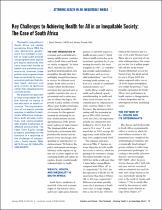| dc.contributor.author | Sanders, David | |
| dc.contributor.author | Chopra, Mickey | |
| dc.date.accessioned | 2023-05-31T07:25:23Z | |
| dc.date.available | 2023-05-31T07:25:23Z | |
| dc.date.issued | 2006 | |
| dc.identifier.citation | Sanders, D., & Chopra, M. (2006). Key challenges to achieving health for all in an inequitable society: The case of South Africa. American Journal of Public Health, 96 (1), 73-78. 10.2105/AJPH.2005.062679 | en_US |
| dc.identifier.issn | 1541-0048 | |
| dc.identifier.uri | 10.2105/AJPH.2005.062679 | |
| dc.identifier.uri | http://hdl.handle.net/10566/8970 | |
| dc.description.abstract | The health inequalities in South Africa are rapidly worsening. Since 1994, the new democratic government has initiated a number of large-scale policies and programs with explicit pro-equity objectives that have improved access to health care and other social resources. However, these policies and programs have been constrained by macroeconomic policies that dictate fiscal restraint and give priority to technical rather than developmental considerations.
We propose an approach to improving health for all that focuses on equity in the allocation of health resources. The implementation of pro-equity policies requires, in addition to technically efficacious interventions, both advocacy initiatives and communication with, and the involvement of, affected communities. The Cape Town Equity Gauge project is presented as one example of a response to the challenge of inequity. | en_US |
| dc.language.iso | en | en_US |
| dc.publisher | American Public Health Association | en_US |
| dc.subject | Public health | en_US |
| dc.subject | South Africa | en_US |
| dc.subject | Economics | en_US |
| dc.subject | Equality | en_US |
| dc.subject | HIV | en_US |
| dc.subject | Health care | en_US |
| dc.title | Key challenges to achieving health for all in an inequitable society: The case of South Africa | en_US |
| dc.type | Article | en_US |

